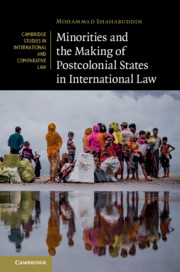Book contents
- Minorities and the Making of Postcolonial States in International Law
- Cambridge Studies in International and Comparative Law: 154
- Minorities and the Making of Postcolonial States in International Law
- Copyright page
- Dedication
- Contents
- Foreword
- Acknowledgements
- Table of Cases
- Abbreviations
- Introduction
- Part I Ethno-nationalism and the Ideology of the Postcolonial State
- Part II International Law and the Postcolonial State
- Bibliography
- Index
- Cambridge Studies in International and Comparative Law
Introduction
Published online by Cambridge University Press: 21 May 2021
- Minorities and the Making of Postcolonial States in International Law
- Cambridge Studies in International and Comparative Law: 154
- Minorities and the Making of Postcolonial States in International Law
- Copyright page
- Dedication
- Contents
- Foreword
- Acknowledgements
- Table of Cases
- Abbreviations
- Introduction
- Part I Ethno-nationalism and the Ideology of the Postcolonial State
- Part II International Law and the Postcolonial State
- Bibliography
- Index
- Cambridge Studies in International and Comparative Law
Summary
The introduction to the book presents the context, scope, normative framework, core arguments, and the general structure of the book. It identifies gaps in existing literature on statehood and minority rights and explains the way the book addresses those gaps. The introduction especially elaborates the background of case studies and their relevance for the book. My unique approach to the case studies that goes beyond the vulnerability framework and instead focuses on the ways minorities are marginalised through the ideological operation of postcolonial states, is also discussed in this part. To support my analysis throughout the book, I have relied mainly on primary materials and archival sources, whenever possible. The research is also informed by a series of interviews with national and international organisations working in Bangladesh. My analysis is influenced by critical, postcolonial, and TWAIL (Third World Approaches to International Law) scholarship. Although the historical context is South Asia and the specific focus is on colonial India and present-day Bangladesh and Myanmar, many of the arguments, observations, and findings of the book should be equally relevant to other postcolonial states. The normative and pragmatic significance of the book beyond the Rohingya or the CHT crisis lies in this fact.
Keywords
- Type
- Chapter
- Information
- Publisher: Cambridge University PressPrint publication year: 2021

